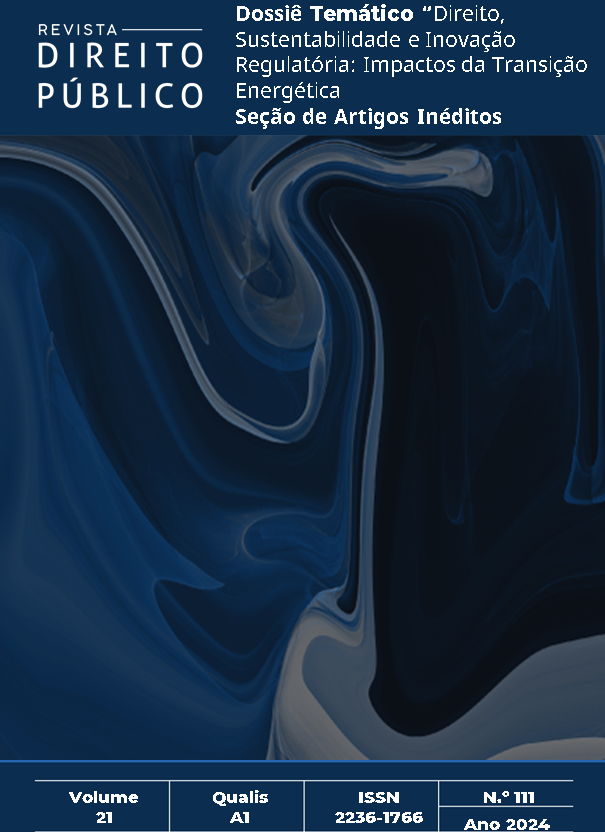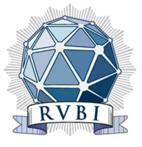Flexible Regulation to Advance Public Transport Electrification:
The Role of the Regulatory Sandbox
DOI:
https://doi.org/10.11117/rdp.v21i111.7938Abstract
The decarbonization of transport necessarily involves the electrification of urban bus fleets. However, there are several challenges to advancing this agenda, including the need for proposing flexible and efficient regulation that facilitates the transition to sustainable public transport. To accelerate the promotion of electric buses in Brazilian cities, this paper presents and discusses the use of regulatory sandboxes. Already adopted in sectors such as information technology and fintechs, regulatory sandboxes allow for the testing of new regulations, business models, and technologies in a controlled environment. For instance, the Brazilian Electricity Regulatory Agency (ANEEL) is conducting a tariff sandbox to experiment with new tariffs. The objective of this paper is to propose the expansion of this sandbox to include two significant bottlenecks in the electrification of public transport: business models and public contracts. Supported by a descriptive and qualitative research methodology, the paper presents the sandbox tool and its relationship with the necessary regulatory flexibility to promote technological innovations. The research highlights the importance of an adaptive regulatory environment to improve the balance between the negative and positive externalities of new sustainable technologies, given that in Brazil, the divisions of constitutional competencies and market resistance are significant challenges. The paper concludes that regulatory sandboxes can accelerate the implementation of technological innovations, positively influencing public policy formulation and the development of a regulatory framework for electric mobility that overcomes barriers to the electrification of public transportation.
Downloads
References
Referências
ALAASSAR, Ahmad; MENTION, Anne-Laure; AAS, Tor Helge. Exploring how social interactions influence regulators and innovators: The case of regulatory sandboxes. Technological Forecasting and Social Change, v. 160, p. 120257, 2020. DOI: https://doi.org/10.1016/j.techfore.2020.120257
ARANHA, Marcio Iorio. Manual de Direito Regulatório: Fundamentos de Direito Regulatório. 4. ed. rev. ampl. London: Laccademia Publishing, 2018
ASHFORD, Nicholas; RENDA, Andrea. Aligning policies for low-carbon systemic innovation in Europe. Centre for European Policy Studies, 2016.
ATTREY, Angela; LESHER, Molly; LOMAX, Christopher. The role of sandboxes in promoting flexibility and innovation in the digital age. 2020.
BALDWIN, Robert; CAVE, Martin; LODGE, Martin. Understanding regulation: theory, strategy, and practice. Oxford University Press, 2011. DOI: https://doi.org/10.1093/acprof:osobl/9780199576081.001.0001
BANCO INTERAMERICANO DE DESENVOLVIMENTO (BID); MINISTÉRIO DO DESENVOLVIMENTO REGIONAL (MDR). Guia de eletromobilidade. Orientações para estruturação de projetos no transporte coletivo por ônibus. Brasília, 2022.
BAPTISTA, Pedro K. I. Por que quando e até onde regular as normas tecnologias? Entre Inovação e preservação, os desafios trazidos pelas tecnologias disruptivas. In: FREITAS, Thaís Valverde de. 2018.
BENNEAR, Lori S.; WIENER, Jonathan B. Adaptive regulation: instrument choice for policy learning over time. 2019. Disponível em: https://www.hks.harvard.edu. Acesso em: 17 jul. 2024.
BLACK, Julia; KINGSFORD SMITH, Dimity. Critical reflections on regulation. Australasian Journal of Legal Philosophy, v. 27, n. 2002, p. 1-46, 2002.
BLACK, Julia; BALDWIN, Robert. Really Responsive Risk-Based Regulation. Law & Policy, 32: 181-213, 2010. Disponível em: https://doi.org/10.1111/j.1467-9930.2010.00318.x. DOI: https://doi.org/10.1111/j.1467-9930.2010.00318.x
BLIND, Knut. The Use of the Regulatory Framework for Innovation Policy in: SMITS, Ruud;
KUHLMANN, Stefan; SHAPIRA, Philip (Ed.). The Theory and Practice of Innovation Policy. Edward Elgar Publishing Inc., p. 217-246, 2010.
BECKSTEDDE, Ellen et al. Regulatory sandboxes: Do they speed up innovation in energy? Energy Policy, v. 180, p. 113656, 2023. DOI: https://doi.org/10.1016/j.enpol.2023.113656
BOVERA, Filippo; LO SCHIAVO, Luca. From Energy Communities to Sector Coupling: A Taxonomy for Regulatory Experimentation in the Age of the European Green Deal. Disponível em: https://ssrn.com/abstract=4103062 ou http://dx.doi.org/10.2139/ssrn.4103062,2022 DOI: https://doi.org/10.2139/ssrn.4103062
BOVERA, Filippo; LO SCHIAVO, Luca. From Energy Communities to Sector Coupling: A Taxonomy for Regulatory Experimentation in the Age of the European Green Deal. In: CIRED Workshop 2016, 2016.
BOVERA, Filippo; DELFANTI, Maurizio; FUMAGALLI, Edoardo; LO SCHIAVO, Luca; VAILATI, Roberto. Regulating electricity distribution networks under technological and demand uncertainty. Energy Policy, 149 (111989), 2021. DOI: https://doi.org/10.1016/j.enpol.2020.111989
BRASIL. Constituição da República Federativa do Brasil, 1988. Disponível em: http://www.planalto.gov.br/ccivil_03/constituicao/constituicaocompilado.htm. Acesso em: outubro de 2020.
BRASIL. Lei nº 11.079, de 30 de dezembro de 2004. Institui normas gerais para licitação e contratação de parceria público-privada no âmbito da administração pública. Diário Oficial [da] República Federativa do Brasil, Brasília, DF, 31 dez. 2004. Disponível em: http://www.planalto.gov.br/ccivil_03/_ato2004-2006/2004/lei/l11079.htm. Acesso em: 9 jul. 2024.
BRASIL. Lei nº 14.133, de 1º de abril de 2021. Lei de Licitações e Contratos Administrativos. Diário Oficial [da] República Federativa do Brasil, Brasília, DF, 1 abr. 2021. Disponível em: https://www.planalto.gov.br/ccivil_03/_Ato2019-2022/2021/Lei/L14133.htm. Acesso em: 9 jul. 2024.
BRASIL. Lei Complementar nº 182, de 1º de junho de 2021. Institui o marco legal das startups e do empreendedorismo inovador. Diário Oficial [da] República Federativa do Brasil, Brasília, DF, 2 jun. 2021. Disponível em: http://www.planalto.gov.br/ccivil_03/leis/lcp/Lcp182.htm. Acesso em: 9 jul. 2024.
BRASIL. Lei Complementar nº 73, de 10 de fevereiro de 1993. Institui a Lei Orgânica da Advocacia-Geral da União e dá outras providências. Diário Oficial [da] República Federativa do Brasil, Brasília, DF, 11 fev. 1993. Disponível em: http://www.planalto.gov.br/ccivil_03/leis/lcp/lcp73.htm. Acesso em: 9 jul. 2024.
BRASIL. Lei nº 10.683, de 28 de maio de 2003. Dispõe sobre a organização da Presidência da República e dos Ministérios, e dá outras providências. Diário Oficial [da] República Federativa do Brasil, Brasília, DF, 29 maio 2003. Disponível em: http://www.planalto.gov.br/ccivil_03/leis/2003/L10.683.htm. Acesso em: 9 jul. 2024.
BRASIL. Decreto nº 8.910, de 22 de novembro de 2016. Aprova a Estrutura Regimental e o Quadro Demonstrativo dos Cargos em Comissão e das Funções de Confiança do Ministério da Fazenda e remaneja cargos em comissão. Diário Oficial [da] República Federativa do Brasil, Brasília, DF, 23 nov. 2016. Disponível em: http://www.planalto.gov.br/ccivil_03/_Ato2015-2018/2016/Decreto/D8910.htm. Acesso em: 9 jul. 2024.
BRASIL. Decreto nº 10.540, de 5 de novembro de 2020. Estabelece normas de consolidação dos atos normativos e de simplificação administrativa no âmbito do Poder Executivo federal. Diário Oficial [da] República Federativa do Brasil, Brasília, DF, 6 nov. 2020. Disponível em: http://www.planalto.gov.br/ccivil_03/_Ato2019-2022/2020/Decreto/D10540.htm. Acesso em: 9 jul. 2024.
BROWN, Ashley C.; STERN, Jon; TENENBAUM, Bernard. World Bank Handbook for Evaluating Infrastructure Regulatory Systems. Washington: World Bank, 2006. DOI: https://doi.org/10.1596/978-0-8213-6579-3
BISCHOOF, Toren Sören; VON DER LEYEN, Simon; WINKLER-PORTMANN, Kaja; BAUKNECHT, Dierk. Regulatory experimentation as a tool to generate learning processes and govern innovation. An analysis of 26 international cases. Sofia-Diskussionsbeiträge 20-7, Darmstadt, 2020. DOI: https://doi.org/10.46850/sofia.9783941627857
BOON, Wouter P. C.; BAKKER, Sjoerd. Learning to shield–Policy learning in socio-technical transitions. Environmental Innovation and Societal Transitions, v. 18, p. 181-200, 2016. DOI: https://doi.org/10.1016/j.eist.2015.06.003
BYSKOV, Mikkel; MARKARD, Jochen; DAHL, Anja. Policies, actors and sustainability transition pathways: A study of the EU’s energy policy mix. Research Policy, v. 48, n. 10, p. 103668, 2019. DOI: https://doi.org/10.1016/j.respol.2018.09.003
CALIL, Ana Luiza Fernandes; FERRARI, Isabela; BECKER, Daniel. Coord. Inovação no setor público: o desafio de equilibrar o papel do Estado e do Direito. Regulação 4.0. Novas Tecnologias sob a perspectiva regulatória. São Paulo: Thomson Reuters Brasil, 2019.
CHESBROUGH, Henry William. Open Innovation: The New Imperative for Creating and Profiting from Technology. Harvard Business School Press, 2003.
COGLIANESE, Cary. Listening-Learning-Leading: A Framework for Regulatory Excellence. Penn Program on Regulation, 2015.
CONSONI, Flávia Lima et al. Estudo de Governança e Políticas Públicas para Veículos Elétricos. Projeto Sistemas de Propulsão Eficiente – PROMOB-e (Projeto de Cooperação Técnica bilateral entre a Secretaria de Desenvolvimento e Competitividade Industrial – SDCI/MDIC e a Cooperação Alemã para o Desenvolvimento Sustentável (GIZ). Disponível em: http://www.promobe.com.br/biblioteca/publicacoes, 2018.
COMISSÃO EUROPÉIA. Better Regulation “Toolbox”, Capítulo 3. Disponível em: http://ec.europa.eu/smart-regulation/guidelines/docs/br_toolbox_en.pdf, 2015.
FALLER, Daniel; JUNIOR, Pedro Masiero. A eficiência energética dos veículos elétricos, as oportunidades e desafios para o setor elétrico brasileiro. Agência Canal Energia. Rio de Janeiro, 19 de dezembro de 2019.
FASSIO, Rafael Carvalho de; RADAELLI, Viviane; DE AZEVEDO, E.; DÍAZ, K. Revisitando as compras públicas de inovação no Brasil: oportunidades jurídicas e institucionais. 2021. DOI: https://doi.org/10.18235/0003622
FASSIO, Rafael Carvalho de; RADAELLI, Viviane; DE AZEVEDO, E.; DÍAZ, K. Contratações de inovação: guia de alternativas jurídicas e de boas práticas para contratações de inovação no Brasil. 2022. DOI: https://doi.org/10.18235/0004146
FASSIO, Rafael Carvalho de. Sandbox Regulatório no Marco Legal das Startups/Tribunal de Contas da União. Brasília: TCU, Laboratório de Inovação, 2023.
FESER, Daniel; WINKLER-PORTMANN, Simon; BISCHOFF, Toren Sören; BAUKNECHT, Dierk; BIZER, Kilian; FÜHR, Martin; VOGEL, Maike. Institutional conditions for the up-take of governance experiments - A comparative case study (No. 28/2021). ifh Working Paper, 2021.
FENWICK, Mark; KAAL, Wulf A.; VERMEULEN, Erik P. M. Regulation tomorrow: what happens when technology is faster than the law. American University Business Law Review, v. 6, p. 561, 2016. DOI: https://doi.org/10.2139/ssrn.2834531
GEELS, Frank. Technological transitions as evolutionary reconfiguration processes: a multilevel perspective and a case-study. Research Policy, v. 31, p. 1257–1274, 2002. DOI: https://doi.org/10.1016/S0048-7333(02)00062-8
GEELS, Frank. Processes and patterns in transitions and system innovations: Refining the coevolutionary multi-level perspective. Technological Forecasting Social Change, v. 72, p. 681–696, 2005. DOI: https://doi.org/10.1016/j.techfore.2004.08.014
GEELS, Frank William et al. The Socio-Technical Dynamics of Low-Carbon Transitions. Joule, v. 1, n. 3, p. 463–479, 2017. DOI: https://doi.org/10.1016/j.joule.2017.09.018
HODSON, Mike; MARVIN, Simon. Can cities shape socio-technical transitions and how would we know if they were? Research Policy, v. 39, n. 4, p. 477–485, 2010. DOI: https://doi.org/10.1016/j.respol.2010.01.020
HODGSON, Geoffrey Martin. What are institutions? Journal of Economic Issues, v. 40, p. 1-25, 2006. DOI: https://doi.org/10.1080/00213624.2006.11506879
HODSON, Mike; GEELS, Frank William; MCMEEKIN, Andrew. Reconfiguring urban sustainability transitions, analysing multiplicity. Sustainability (Switzerland), v. 9, n. 2, 2017. DOI: https://doi.org/10.3390/su9020299
HOWE, Cymene et al. Paradoxical Infrastructures: Ruins, Retrofit, and Risk. v. 41, n. 3, p. 547–565, 2016. DOI: https://doi.org/10.1177/0162243915620017
HUANG, X.; LIN, Y.; LIM, M. K.; ZHOU, F.; DING, R.; ZHANG, Z. Evolutionary dynamics of promoting electric vehicle-charging infrastructure based on public–private partnership cooperation. Energy, v. 239, p. 12228, 2022. DOI: https://doi.org/10.1016/j.energy.2021.122281
HUGHES, Ian; BYRNE, Edmond; MULLALLY, Gerard; SAGE, Colin (Eds.). Metaphor, sustainability, transformation: Transdisciplinary perspectives on transitions to sustainability. Routledge, 2017.
HAYEK, Friedrich August von. [1960] Os Fundamentos da Liberdade. Brasília: Editora Universidade de Brasília, 1983.
INTERNATIONAL ENERGY AGENCY. Global EV Outlook 2020: Entering the decade of electric drive? Paris: IEA, 2020. Disponível em: https://www.iea.org/reports/global-ev-outlook-2020. Acesso em: 9 jul. 2024.
INTERNATIONAL SMART GRID ACTION NETWORK (ISGAN). Innovative Regulatory Approaches with Focus on Experimental Sandboxes - Casebook. 2019. Disponível em: https://www.iea-isgan.org/casebook-on-innovative-regulatory-approaches-with-focus-on-experimental-sandboxes/. Acesso em: 9 jul. 2024.
INTERNATIONAL COUNCIL ON CLEAN TRANSPORTATION (ICCT). European Vehicle MarketStatistics.2020b.Disponívelem:https://theicct.org/sites/default/files/publications/ICCT_EU_Pocketbook_2020_Web_Dec2020.pdf. Acesso em: 20 dez. 2020.
INTERNATIONAL SMART GRID ACTION NETWORK (ISGAN). Regulatory Sandbox 2.0 Project. 2021. Disponível em: https://www.iea-isgan.org/policy-messages-from-the-isgan-regulatory-sandbox-2-0-project/. Acesso em: 9 jul. 2024.
INSTITUTE FOR TRANSPORTATION & DEVELOPMENT POLICY (ITDP). From Santiago to Shenzhen: How Electric Buses are Moving Cities. Relatório. 2021. Disponível em: https://www.itdp.org/publication/from-santiago-to-shenzhen-how-electric-buses-are-moving-cities/. Acesso em: junho de 2022.
JENÍK, Ivo; DUFF, Schan. How to build a regulatory sandbox. A Practical Guide for Policy Makers, p. 4-12, 2020.
KUMAR, Rajeev Ranjan; CHAKRABORTY, Abhishek; MANDAL, Prasenjit. Promoting electric vehicle adoption: Who should invest in charging infrastructure? Transportation Research Part E: Logistics and Transportation Review, v. 149, p. 102295, 2021. DOI: https://doi.org/10.1016/j.tre.2021.102295
KÖHLER, Jonathan; GEELS, Frank William; KERN, Florian; MARKARD, Jochen; ONSONGO, Edward; WIECZOREK, Anna; WELLS, Peter. An agenda for sustainability transitions research: State of the art and future directions. Environmental Innovation and Societal Transitions, v. 31, p. 1-32, 2019. DOI: https://doi.org/10.1016/j.eist.2019.01.004
KUNGL, Gregor; GEELS, Frank William. Sequence and alignment of external pressures in industry destabilization: Understanding the downfall of incumbent utilities in the German energy transition (1998–2015). Environmental Innovation and Societal Transitions, v. 26, n. January, p. 78–100, 2018. DOI: https://doi.org/10.1016/j.eist.2017.05.003
LEAL, Thaís Albuqerque Correia Braga; CONSONI, Flávia Lima. Eletrificação Veicular: definições, tendências, e possíveis impactos na indústria automotiva nacional. In: Textos para Discussão. Núcleo de Estudos e Políticas da Consultoria Legislativa do Senado Federal. Brasília, v. 308, p. 1–31, 2022.
LOPES, Othon de Azevedo. Fundamentos da Regulação. Rio de Janeiro: Processo, 2018. 345 p. ISBN 978-85-93741-16-6. Disponível em: https://www.lexml.gov.br/urn/urn:lex:br:rede.virtual.bibliotecas:livro:2018;001139031. Acesso em: 9 Jul. 2024.
LOORBACH, Derk; WITTMAYER, Julia Margarete. Governance of Urban Sustainability Transitions. Theory and Practice of Urban Sustainability Transitions. Springer Japan, 2016. DOI: https://doi.org/10.1007/978-4-431-55426-4
MARKARD, Jochen; TRUFFER, Bernhard; RAVEN, Rob. Sustainability Transitions: An emerging field of research and its prospects. Research Policy, v. 41, p. 955–967, 2012. DOI: https://doi.org/10.1016/j.respol.2012.02.013
MOSES, Lyria Bennett. How to Think about Law, Regulation and Technology: Problems with Technology as a Regulatory Target. 2015.
ORGANIZAÇÃO PARA A COOPERAÇÃO E DESENVOLVIMENTO ECONÔMICO (OECD). Regulatory Sandboxes and Innovation Testbeds: A Global Overview. 2020. Disponível online: OECD iLibrary.
ORGANIZAÇÃO MUNDIAL DA SAÚDE (OMS). Air pollution and child health: prescribing clean air. Summary. Geneva: (WHO/CED/ PHE/18.01). Licence: CC BY-NC-SA 3.0, 2018. Disponível em: https://apps.who.int/iris/bitstream/handle/10665/275545/WHO-CED-PHE-18.01-eng.pdf?sequence=2&isAllowed=y. Acesso em: 9 jul. 2024.
RINGE, Wolf-Georg; RUOF, Christopher. Regulating Fintech in the EU: the Case for a Guided Sandbox. European Journal of Risk Regulation, v. 12, n. 1, p. 35-56, 2021. Disponível em: https://doi.org/10.1017/err.2021.42. DOI: https://doi.org/10.1017/err.2021.42
SCHITTEKATTE, Tim; MEEUS, Leonardo. Least-cost distribution network tariff design in theory and practice. The Energy Journal, v. 41, n. 5, p. 119-155, 2020. Disponível em: https://www.ssrn.com/abstract=3774893. Acesso em: 9 jul. 2024. DOI: https://doi.org/10.5547/01956574.41.5.tsch
WADY, Ariane Fucci. Os sinais regulatórios necessários para o desenvolvimento da mobilidade elétrica na cidade: uma abordagem com foco na infraestrutura de recarga. 2021. Dissertação (Mestrado em Política Científica e Tecnológica) - Universidade Estadual de Campinas, Campinas, SP, 2021. Disponível em: https://repositorio.unicamp.br/handle/REPOSIP/353184. Acesso em: 17 jul. 2024.
WORLD RESOURCES INSTITUTE (WRI Brasil). O Estado da Qualidade do Ar no Brasil. 2021. Disponível em: https://www.wribrasil.org.br/sites/default/files/wri-o-estado-da-qualidade-do-ar-no-brasil.pdf.
Published
How to Cite
Issue
Section
License
Copyright (c) 2024 Direito Público

This work is licensed under a Creative Commons Attribution-NonCommercial 4.0 International License.
O(s)/A(s) autores(as) dos manuscritos submetidos concorda(m) com as regras a seguir:
1) Todos os autores e autoras participaram do trabalho, são responsáveis pelas ideias e conceitos nele emitidos e atestam sua conformidade com os princípios éticos exigidos.
2) Todos os autores e autoras concordam com a forma final do trabalho e em ceder os direitos para publicação nos canais de publicação da Escola de Direito do IDP.
3) Todos os autores e autoras informam que o manuscrito é de sua autoria e assumem a responsabilidade pelo trabalho, declarando que a obra a ser publicada não infringe quaisquer direitos de propriedade intelectual de terceiros.
3.1) Em caso de submissão simultânea, além da reprovação imediata do artigo e comunicação ao(s) respectivo(s) periódico(s), a Revista Direito Público se reserva o direito de não receber novas submissões de todos os autores implicados pelo prazo de 2 (dois) anos, contado a partir da data de ciência do fato.
4) Todos os autores e autoras autoriza(m) a edição de seu trabalho e cede(m) à Escola de Direito do IDP os direitos de autor para reproduzir, editar e publicar ou veicular o citado trabalho em qualquer forma midiática, resguardada a autoria, em particular sob forma digital, em arquivo eletrônico online na Internet, bem como armazená-los em seu repositório de acordo com o desenvolvimento do processo editorial. Esta concessão não terá caráter oneroso para a Escola de Direito do IDP, não havendo remuneração sob qualquer modalidade pela utilização do referido material, tendo este o caráter de colaboração científica.












